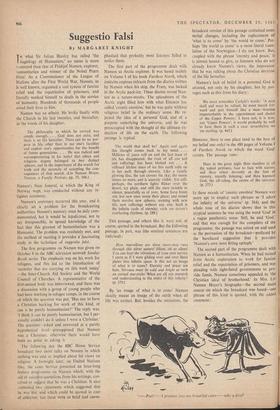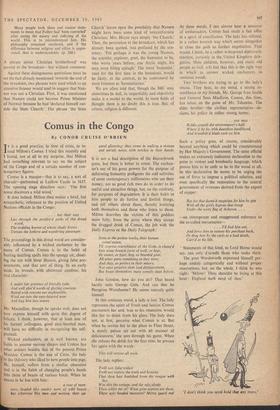Suggestio' Falsi
By MARGARET KNIGHT TN what Sir Julian Huxley has called 'the hagiology of Humanism,' no name is more honoured than that of Fridtjof Nansen, explorer, humanitarian and winner of the Nobel Peace Prize. As a Commissioner of the League of Nations after the First World War,' Nansen, as is well known, organised a vast system of famine relief and the repatriation of prisoners, and literally worked himself to death in the service of humanity. Hundreds of thousands of people owed their lives to him.
Nansen was an atheist. He broke finally with the Church in his late twenties, and thereafter, in the words of his daughter, The philosophy at which he arrived was simple enough. . . . God does not exist, and there is no life hereafter. There can be no pur- pose in life other than to use one's faculties and exploit one's opportunities for the benefit of future generations. . . . He was radical and uncompromising in his belief that ethics and religious dogma belonged to two distinct spheres, and in the importance of the search for truth and the necessity of accepting the con- sequences of that search. (Liv Nansen Hoyer, Nansen. a Family Portrait, pp. 55, 166.) Nansen's State funeral, at which the King of Norway wept, was conducted without any re- ligious ceremony.
Nanscn's centenary occurred this year, and it clearly set a problem for the broadcasting authorities. Nansen's memory must be duly com- memorated, but it would be injudicioul, not to say irresponsible, to spread knowledge of the fact that this greatest of humanitarians was a Humanist. The problem was resolutely met, and the method of meeting it provides a fascinating study in the technique of suggestio falsi.
The first programme on Nansen was given on October 8 in the ABC television` network Sunday Break series. The emphasis was on his work for refugees, and this led to the introduction of `societies that are carrying on this work today' —the Inter-Church Aid Society and the World Council of Churches. A representative of the first-named body was interviewed, and there was a discussion with a group of young people who had been working in refugee camps, in the course of which the question was put, 'Has one to have a Christian backing for work of this kind, or can it be purely humanitarian?' The reply was, '1 think it can be purely humanitarian, but I per- sonally couldn't do it unless I were a Christian.' The question--asked and answered at a purely hypothetical level--presupposed that Nansen was a Christian; otherwise there would have been no point in asking it.
The following day the BBC Home Service broadcast two short talks on Nansen in which nothing was said or implied about his views on religion. A fortnight later, on United Nations Day, the same Service presented an hour-long feature programme on Nansen which, with the aid of selective quotations from his writings, con- trived to suggest that he was a Christian. It also contained two statements which suggested that he was not, and which could be quoted in case of criticism; but these were so brief and unem- phasised that probably most listeners failed to notice them.
The first part of the programme dealt with Nansen as Arctic explorer. It was based mainly on Volume I of his book Farthest North, which contains copious extracts from the diaries written by Nansen when his ship, the Fram, was locked in the Arctic pack-ice. These diaries reveal Nan- sen as a nature-mystic. The splendours of the Arctic night filled him with what Einstein has called 'cosmic emotion,' but he was quite without religious belief in the ordinary sense. He re- jected the idea of a personal God, and of a purpose underlying the universe, and he was preoccupied with the thought of the ultimate ex- tinction of life on the earth. The following passage is typical.
The world that shall be! Again and again this thought comes back to my mind.. . Millions of years roll on and the last trace of life has disappeared; the fruit of all our toil and sufferings has been blotted out. . . . A stiffened lifeless mass of ice this earth rolls on in her path through eternity. Like a faintly glowing disc, the sun crosses the sky; the moon shines no more, and is scarcely visible. Yet still, perhaps, the northern lights flicker over the desert, icy plain, and still the stars twinkle in silence, peacefully as of yore. Some have burnt out, but new ones usurp their place; and round them revolve new spheres, teeming with new life, new sufferings without any aim. Such is the infinite cycle of eternity; such are nature's
everlasting rhythms. (p. 288.)
This passage, and others like it, were not, of course, quoted in the broadcast. But the following passage, in part, was (the omitted sentences are italicised): How marvellous are these snow-shoe runs through this silent nature! Silent, oh so silent! You, can hear the vibrations of your own nerves. I seem as if I were gliding over and over these plains into infinite space. Is this not an image of what is to come? Eternity and peace are here. Nirvana must be cold and bright as such an eternal star-night. What are all our research and understanding in the midst of this infinity? (p. 379.) By 'an image of what is to come' Nansen clearly meant an image of the earth when all life was extinct. But, besides the omissions, the broadcast version of this passage contained some verbal changes, including the replacement of `what is to come' by 'the world to come.' Per- haps 'the world to come' is a more literal trans- lation of the Norwegian—I do not know. But, coupled with the phrase 'eternity and peace,' it is almost bound to give, to listeners who do not already know Nansen's views, the impression that he was talking about the Christian doctrine of the life hereafter.
Nansen's lack of belief in a personal God is attested, not only by his daughter, but by pas- sages such as this from his diary:
We must remember Carlyle's words: 'A man shall and must be valiant, he must march for- ward and quit himself like a man—trusting imperturbably in the appointment and choice of the Upper Powers.' I have not, it is true, any 'Upper Powers'; it would probably be well to have them in such a case; nevertheless we are starting. (p. 443.)
However, there is one place (and to the best of my belief one only) in the 480 pages of Volume I of Farthest. North in which the word `God' occurs. The passage runs : Here in the great night thou standest in all thy naked pettiness, face to face with nature; and thou sittest devoutly at the feet of eternity, intently listening; and thou knowcst God, the all-ruling, the centre of the universe. (p. 373.) In these moods of 'cosmic emotion' Nansen was more apt to employ such phrases as 'I adore the infinity of the universe' (p. 364), and the whole tone of his diaries shows that in this atypical sentence he was using the word 'God' in a vague pantheistic sense. Still, he said 'God: and that was enough for the compilers of the programme; the passage was seized on and used as the peroration of the broadcast—prefaced by the barefaced suggestion that it provides `Nansen's own most fitting epitaph.'
The second part of the programme dealt with Nansen as a humanitarian. When he had turned from Arctic exploration to work for famine relief and the repatriation of prisoners, and was pleading with tight-fisted governments to pro- vide funds, Nansen sometimes appealed to 'the Christian ideal of brotherhood.' In Mrs. Liv Nansen Hoyer's biography—the second main source on which the broadcast was based—one phrase of this kind is quoted, with the added comment : '—Asst!----1 promise you ten beautiful cows—take a diver Many people took these and similar state- ments to mean that Father had 'been converted' after seeing the misery and suffering of the
world. This is to misunderstand him. His philosophy remained unaltered, and if the difference between religion and ethics is appre- ciated, that is understandable. (p. 260.)
A phrase about 'Christian brotherhood' was quoted in the broadcast—but without comment.
Against these disingenuous quotations must be set the fact already mentioned: towards the end of the broadcast, two phrases were used which to an attentive listener would tend to suggest that Nan- sen was not a Christian. First, it was mentioned that Nansen could not become Prime Minister of Norway because he had 'declared himself out- side the State Church.' The phrase 'the State Church' leaves open the possibility that Nansen might have been some kind of nonconformist Christian; Mrs. Hoyer says simply 'the Church.' Then, the peroration to the broadcast, which has already been quoted, was prefaced by the sen- tence: 'Yet perhaps it was the young Nansen, the scientist, explorer, poet, the humanist to be, who wrote years before, one Arctic night, his own most fitting epitaph.' The word 'humanist,' used for the first time in the broadcast, would be likely, in the context, to be understood by most listeners as 'humanitarian.'
We are often told that, though the BBC may sometimes be dull, its impartiality and objectivity make it a model to the world. In most fields of thought there is no doubt this is true. But, of course, religion is different.



























 Previous page
Previous page